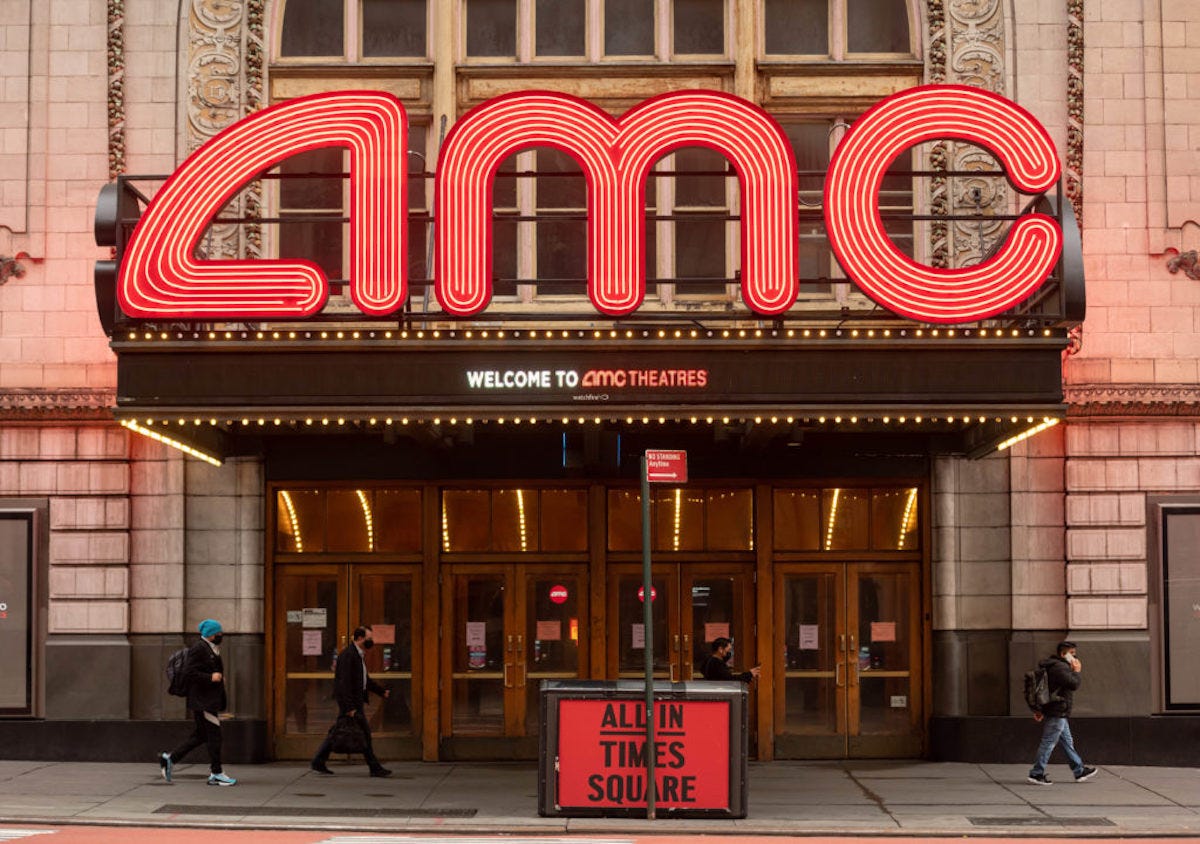
Bo Burnham’s 'Inside' and Art in the Age of Recursion
Plus: AMC is offering a popcorn dividend. Literally.
If there’s a recurring idea or image in Bo Burnham’s special for Netflix, Inside, it’s probably Bo Burnham.
Not just because Bo Burnham made this new comedy (or maybe “comedy”) special all by himself—shooting it and editing it and performing it and writing music for it by himself, in his house, quarantined from the world—meaning that Bo Burnham is the only person on the screen. More because Bo Burnham is often seen inside, or behind, or in front of, or to the side of Bo Burnham. It’s Bo Burnhams all the way down, Bo Burnham commenting on a video made by Bo Burnham, Bo Burnham projected on a wall behind Bo Burnham while Bo Burnham is singing, Bo Burnham’s shadows on the wall as Bo Burnham does a little dance, Bo Burnham playing a video game iteration of Bo Burnham whose main activities are “crying” and “failing to leave the house.”
This recursion is the visual manifestation of the central idea at work in Inside: in an age of screens, in an age of instant decisions, in an age when we know that you know that we know that you are judging us, instantly and without much thought, all we can think about is ourselves and how we are perceived. To a certain sort of person—the Very Online, the social media addict—who we are is less important than who we project we are and who we can convince others we are.
Bo Burnham’s special is a meditation on an almost psychotic solipsism that is driven by the demand for “content” in a world in which screens intermediate most of our interactions with each other. It’s why an early number is dedicated to the idea that it is ironic that he, a white man who considers himself an ally for social justice, refuses to simply step aside and let the world’s victims take center stage; another is dedicated to white women and their Instagram pages, which he mocks in part for their “incredibly derivative political street art.”
But then, aren’t Bo Burnham’s objections to Bo Burnham’s own whiteness in fact incredibly derivative, the sort of thing a well-meaning white person would say? Indeed, is it not reminiscent of his most recent project, Promising Young Woman, in which he played the proverbial “Good Guy” who turns out not to be that Good after all? But by playing a character demonstrating that no Good Guys exist doesn’t this in fact demonstrate he is, actually, a Good Guy? Ah, but Bo Burnham is aware of the derivativeness and Bo Burnham later says that being aware does not allay this problem, meaning that Bo Burnham understands the central contradiction. “I’m so worried that criticism will be levied against me that I levy it against myself before anyone else can,” Bo Burnham says at one point. Bo Burnham is trying to have it both ways. Bo Burnham understands he’s trying to have it both ways. Bo Burnham is going slightly insane because he knows that you know he’s trying to have it both ways.
Bo Burnham, Bo Burnham: always you wrestle inside Bo Burnham. Always you will.
It feels almost heartless—at least a little rude—to dismiss Bo Burnham’s special as the sort that could only be made by an upper-class creative lacking in real responsibilities who chooses to wallow in navel-gazing and psychiatric confession and sadness and loneliness and depression. Unless the whole thing is a put-on—and we cannot dismiss this, knowing that Bo Burnham understands the role of screens in portraying what we want people to see rather than what is true—he’s clearly hurting due to COVID-imposed isolation. That Bo Burnham is sad is, I suppose, sad, but this particular brand of sadness is alien to those with responsibilities like children, or the essential workers who undoubtedly delivered groceries and books and microphones and lights to Bo Burnham’s house while Bo Burnham was making Bo Burnham’s special.
This is not to say that Bo Burnham is wrong about the Internet and its various ills; when Bo Burnham sings a devilish little ditty about the web—“Could I interest you in everything all of the time?”—it gets to the core of our soul-crushing predicament. Humanity is not designed to be bombarded with stimuli and it is damaging to our very spirit to be subjected to examination every living moment of every single day. Our screens are slowly poisoning us with brain-pleasing content, and there’s nothing we care to do about it because companies like Netflix, on which Bo Burnham’s new comedy special is streaming, profit from pleasing our brains and crushing our souls.
But you’re reading this on a screen, so they can’t be all bad. But my understanding that you’re reading it on a screen does not mitigate the fact that I have contributed to the problem of “content.” But we must use the tools of society to improve society. But I’m not really improving it, I’m just demonstrating to the world that I’m aware of, and therefore above, the problem, even as I contribute to it. But … but …
But.
Signal to your friends that you have excellent taste by sharing this newsletter with them; they’ll be impressed by your erudition and appreciate your guidance on all matters cultural.
AMC’s Popcorn Dividend
These are very weird times in the movie business, in large part because you can now spend money on stock that pays off in popcorn.
AMC has leaned into the meme-ification of its stock, offering popcorn to people who invest in it. Literally a popcorn dividend:
According to the company, more than three million individual investors hold about 80 percent of AMC’s shares, making the company something of a people’s stock. On Wednesday, AMC announced a new effort to correspond with shareholders through AMC Investor Connect, a newsletter that will also offer perks.
“We intend to communicate often with these investors, and from time to time provide them with special benefits at our theaters,” Mr. Aron said. “We start with a free large popcorn on us, when they attend their first movie at an AMC theater this summer.”
AMC understands that the Reddit-based army of investors is the best thing it has going for it right now, even better than the big box office gross ($47.5 million from Friday through Sunday; $57.1 million if you include Memorial Day) racked up by A Quiet Place Part II. The beleaguered theater company issued a bunch of new stock in recent days that has helped reduce its overall debt load by more than half a billion dollars. Now the company is suggesting it might buy distressed assets like those of the Arclight chain of theaters.
As a lover of movie theaters, I’m happy; as an amateur investor, I’m mad I didn’t take my own advice and buy $500 worth of stock when it was $2 a share, as that would’ve been worth more than $17,000 at one point Wednesday. As a rational person, though, I’m scratching my head, and a little nervous about what happens when a bunch of average retail investors end up losing their shirts because they invested in a meme.
But hey: they can always cry into their bucket of popcorn, I guess.
Assigned Viewing: Mean Streets (TCM) and The Last Waltz (Prime)
This week on The Bulwark Goes to Hollywood I interviewed Jonathan Taplin, author of The Magic Years: Scenes From a Rock-and-Roll Life. The book is a must-read if you want a firsthand look at life on the road in the 1960s and 1970s, as Taplin was the touring manager for The Band and such luminaries as Bob Dylan, George Harrison, Eric Clapton, the Rolling Stones, and others were in his area of influence.
But I was most excited to talk to Taplin because he was a financier and producer of Martin Scorsese’s Mean Streets and an executive producer on The Last Waltz. As it happens, both are streaming now, Mean Streets on the Turner Classic Movie app and The Last Waltz on Prime Video. The Last Waltz may be my favorite concert movie and Mean Streets is a game-changing film, the sort of flick that set one of America’s foremost auteurs on the path to greatness. It reminds me a bit of an early Springsteen song, something like “Incident on 57th Street” or “Meeting Across the River,” a propulsive, almost manic, tale of small-time hoods with small-time dreams in over their heads.















Great read, thanks!
Sorry to hear you don't care for Burnham's, whatever it is very much, because I genuinely love his movie "Eighth Grade," and I recommend it to people all the time, but this looks like a blunder.